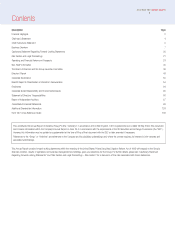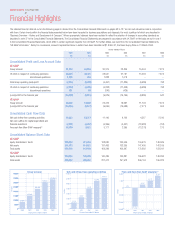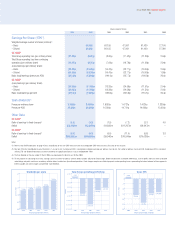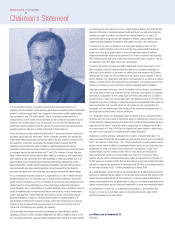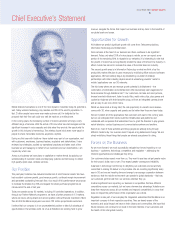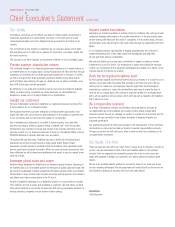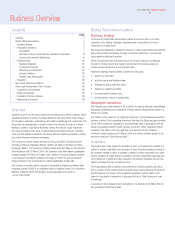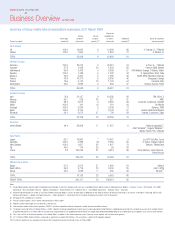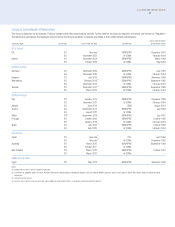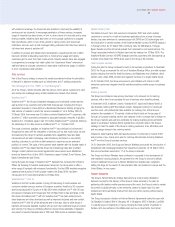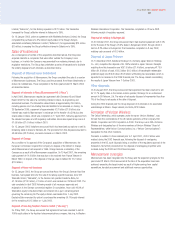Vodafone 2004 Annual Report Download - page 12
Download and view the complete annual report
Please find page 12 of the 2004 Vodafone annual report below. You can navigate through the pages in the report by either clicking on the pages listed below, or by using the keyword search tool below to find specific information within the annual report.
Group Marketing provides leadership and coordination across the Group on a range of
marketing and commercial activities, including product, content, brand management
and development, Partner Networks and global accounts. These activities include the
design and rollout of segmented service propositions to consumer and business
customers, such as Vodafone live!™, and the Group’s business offerings.
Group Technology & Business Integration leads in the selection, development and
implementation of global technology solutions to support the terminals, service
platforms, network and IT requirements of the Group. It drives the benefits of scale
and scope to deliver enhanced customer experience, increased speed to market and
an improved strategic cost position by applying the principle of ‘design once, deploy
many times’ and by working closely with suppliers.
Business integration
A new function, “Business Integration”, has been created within Group Technology to
further leverage the scale of the Group’s global footprint. This function is expected to
improve the Group’s speed to market for new products at the same time as improving
the Group’s strategic cost position. The work of this function was initiated in October
2003 and is intended to lead the Group through a business transformation process
spanning up to five years.
The Service Delivery Platform, which in part delivers Vodafone live!™, is one early
example of the Group’s “develop once, deploy many times” concept. This concept
allows the architecture, design and development of core enabling technologies to be
undertaken only once, and rolled out to the Group’s operating companies, thus saving
on costs of design and development in each country. The Group continues to build its
capability to manage suppliers on a global basis and has delivered synergies through
negotiating global contracts, particularly in the areas of terminals, network
infrastructure and IT. There has been continued progress in eCommerce activities with
the Group taking an industry leading position in the effective use of e-auctions. The
Group continues to leverage scale in the handset area, consolidating country
requirements and volumes for supplier negotiation. This has provided savings and has
supported Vodafone’s ability to shape an enhanced customer experience through the
specification of features and functions.
These early business integration programmes provide a model for common
development in other Group Technology areas, to enable the Group to take advantage
of future opportunities to leverage the Group’s scale and scope. The number of
different markets in which the Group now operates provides opportunities for
extensive sharing of best practice across operating companies, ensuring reduced time
to market, increased customer relevance and greater competitive advantage.
Products and services
Voice services
Revenues from voice services make up the largest portion of the Group’s turnover
and, consequently, the Group is undertaking a wide range of activities to encourage
growth in the usage of these services.
Pricing is an important factor for customers choosing a mobile phone network and is
also important in encouraging usage of services whilst maximising revenues and
margins. Two main pricing models exist in the mobile market – contract and prepaid.
Relationships with contract customers are usually governed by a formal, written
contract and credit facilities are granted to them to enable access. Within a prepaid
pricing scheme, a customer pays in advance, or “tops up”, in order to gain access to
mobile network services. The take-up of these models in the markets in which the
Group operates varies significantly, from Japan and the US, where the vast majority of
customers are on contract plans, to Italy, where the market is predominantly prepaid.
The Group has continued to invest in providing enhanced network services and
coverage for existing services to endeavour to ensure that customers can use their
mobile phone whenever they want to, making it an integral part of their lives. Together
Vodafone Group Plc Annual Report 2004
10
Business Overview continued
3G
The Group has secured 3G licences in all jurisdictions in which it operates through its
subsidiary undertakings and in which such licences have been awarded to date.
Cumulative expenditure on 3G licences was £14.4 billion at 31 March 2004 and was
funded from the Group’s existing facilities. Most of this expenditure (£13.1 billion)
occurred during the 2001 financial year.
Vodafone expects to participate in additional 3G licence allocation procedures in other
jurisdictions in which it operates. No assurances can be given that the Group will be
successful in obtaining any 3G licences for which it intends to apply or bid.
The construction of 3G network infrastructure has continued throughout the 2004
financial year, with tangible capital expenditure on 3G network infrastructure
amounting to approximately £1.5 billion during the financial year. The Group presently
expects capitalised tangible fixed asset additions to be around £5.0 billion in the 2005
financial year, 35% of which is expected to be in respect of 3G network infrastructure.
This expenditure is expected to be financed through operating cash flows and existing
borrowing facilities. The Group’s 3G network infrastructure supply is managed by
agreements for pricing and terms with all key suppliers, including Ericsson, Nokia,
Nortel and Siemens.
The launch of the 3G data service in February 2004 was an example of Vodafone
leveraging its scale and scope. 3G commercial services in Europe, in the form of the
Vodafone Mobile Connect 3G/GPRS datacard, were able to be launched in much
reduced timescales in seven countries in early 2004 through working with common
suppliers using universal network technology. The commercial launch of the 3G
service was the result of a three year global programme of technology selection,
development and testing across the Group companies.
In Japan, the 3G network has been rolled out with the goal of national coverage and
the eventual replacement of the current Personal Digital Cellular (“PDC”) network. In
Europe, the deployment of 3G has been centred on major metropolitan areas, thereby
providing a complementary service to the current 2G and 2.5G networks. The
introduction of Wideband Code Division Multiple Access (“W-CDMA”) as the third
generation standard will, over time, provide roaming capabilities between Japan and
other territories that use the W-CDMA standard.
Vodafone live!™ with 3G was introduced to both business and consumer markets in
Europe on 4 May 2004.
2G
The majority of the Group’s controlled networks operate on a Global System for Mobile
Communications (“GSM”) network on which General Packet Radio Service (“GPRS”) is
also provided.
Wireless LAN
Four of the Group’s subsidiary companies, in Germany, Italy, Portugal and Spain, now
offer a public access Wireless LAN service. The Group views public access Wireless
LAN as important in offering a complete mobile data connectivity solution to its
customers, and more of the Group’s operating companies are expected to launch
Wireless LAN services, mainly through roaming agreements.
Global services
A major focus of the Group’s strategy is to delight its customers, delivering a superior
customer experience and developing customer loyalty at all touchpoints, introducing
end to end voice and data propositions to target customer segments, and achieving
customer preference for the Vodafone brand.
To achieve this objective requires a highly focused, increasingly integrated and
operationally efficient business, providing the best products and services across the
greatest number of markets. The Group established two new central functions in July
2003; Group Marketing and Group Technology & Business Integration.



